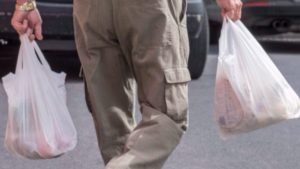From the Nooksack River to Locust Beach, thin, single-use plastic bags are consistently one of the top five pieces of trash we find at cleanups in our community, despite Bellingham’s own 2011 reusable bag ordinance. This illustrates one of the amazing qualities of our region’s fresh and saltwater ecosystems; they are dynamic, constantly moving and flowing downstream into our ocean. But that means nothing stays in one place — plastic pollution anywhere becomes plastic pollution everywhere.
Bellingham is the only city in Whatcom County to take action on plastic bags along with La Conner in Skagit County and over 25 other jurisdictions in the state. It is time to make reusable bags a tool for waste reduction across the state, not just through piecemeal, local efforts. We have a chance to do just that this year, joining the ranks of others like Hawaii and California to pass the Reusable Bag Bill (HB 1205 / SB 5323).
Single-use plastic bags have an estimated useful life of just minutes before beginning their journey to the landfill, to our waterways, or into the stomachs of orcas and other wildlife. Plastic persists in the environment for hundreds of years, just to be used for one grocery trip. And even if the bag is reused once as a trash liner or for dog waste, it still will end up where we don’t want it. Recent studies have also shown that broken-down pieces of plastic not only contain toxic chemicals from the plastic itself, but other chemical contaminants such as carcinogenic polychlorinated biphenyls (PCBs) can cling to the surface of plastic pieces, making the toxic effect on wildlife an even bigger concern.
 Thankfully, the Reusable Bag Bill is even better than the Bellingham and La Conner ordinances, because it will apply to all retailers (many of whom support the bill, since it will give them more consistency in store operations across the state). It will add a ten-cent pass through fee that retailers keep when providing someone with a paper bag or thicker three-millimeter bag, that can be used again and again. This fee covers the cost for small mom-and-pop retailers. What’s more, the ten-cent fee is waived for people and families on limited incomes who may have forgotten to bring their reusable bag.
Thankfully, the Reusable Bag Bill is even better than the Bellingham and La Conner ordinances, because it will apply to all retailers (many of whom support the bill, since it will give them more consistency in store operations across the state). It will add a ten-cent pass through fee that retailers keep when providing someone with a paper bag or thicker three-millimeter bag, that can be used again and again. This fee covers the cost for small mom-and-pop retailers. What’s more, the ten-cent fee is waived for people and families on limited incomes who may have forgotten to bring their reusable bag.
Join the hundreds of businesses, organizations, elected officials, and individuals speaking in support of the Reusable Bag Bill (HB 1205/SB 5323) by writing or calling your State Senator and Representatives today (see sample comment below)! We can move away from single-use plastic one step at a time. Find your legislator’s contact information here.
Sample letter to send your Senator and Representatives:
Subject line: Please support the Reusable Bag Bill (SB 5323/HB 1205)
Dear Representative/Senator _______,
Thank you for your public service. I am writing to ask for your support of the Reusable Bag Bill (SB 5323/HB 1205).
As a steward of our waterways, beaches, the Salish Sea, and the Pacific Ocean — and as a constituent in your district — I ask for your leadership in protecting our public land, waters, and communities from the impacts of single-use plastics by supporting the Reusable Bag Bill. Over 25 cities have passed ordinances eliminating single-use plastic bags at grocery and other retail stores. I think it is time for the legislature to act and follow suit. This bill has support from both clean water advocates and the retail sector, from mom-and-pop stores to large stores like Fred Meyer and Safeway.
Nothing we use for a few minutes should be allowed to pollute our oceans and rivers and threaten wildlife for centuries.
Thank you for your consideration and I hope you will support the Reusable Bag Bill (SB 5323/HB 1205).
Sincerely,
[Name]
[Contact information]
